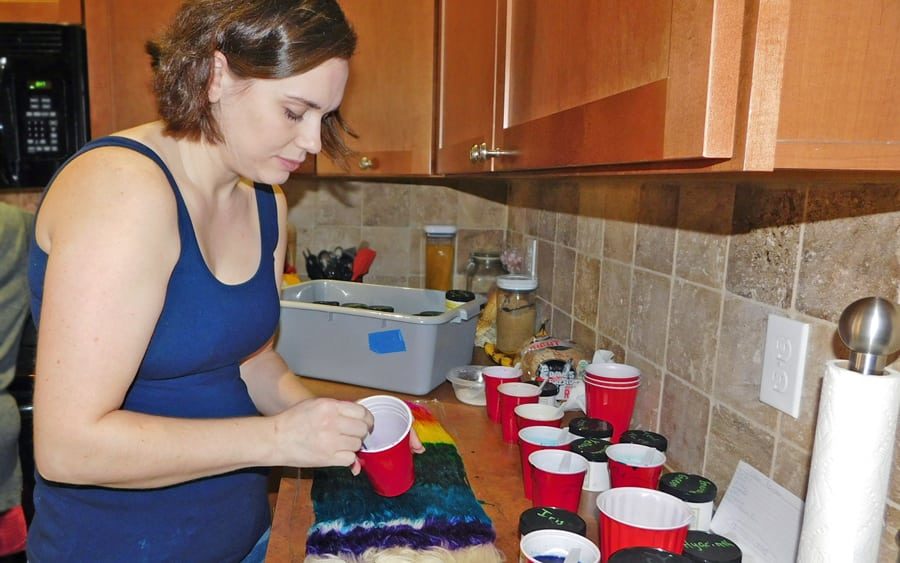
Home » Tri-Cities women create vivid rainbows in wool for fiber artists
Tri-Cities women create vivid rainbows in wool for fiber artists

March 15, 2016
Three Tri-Cities women enjoy giving fiber artists new brilliant choices by creating kaleidoscopes of color.
[blockquote quote="All of us have had an interest in fiber arts and crafts all our lives and we feel blessed to be able to do something we love." source="Melissa Lyle, founder of S.M.A.K. Super Fibers" align="right" max_width="300px"]
They’re owners of S.M.A.K. Super Fibers, a home-based business that makes hand-dye wool and other animal fibers. They sell their yarns on Etsy.com and at Badger Mountain Yarns in Richland, and at local bazaars during the holiday season.
The women started the home-based business in February 2015, selling first on Etsy.
S.M.A.K. is an acronym created from the first initials of the founders: Sara Tracy of Kennewick; Ariana Howland of Richland; and Melissa Lyle of West Richland. The fourth founder is no longer associated with the company.
The women have created 55 color combinations they offer as their standards and try to keep several skeins of them on hand for filling orders.
“We advertise that orders will be filled within three weeks but, other than the holiday season, we can usually get them out faster,” said Howland.
They meet about twice a week to dye yarns for orders and to experiment with different color combinations and fibers.
“Once we’re set up to work the actual dying goes fairly quickly,” said Tracy.
They’ve been taking turns working in each other’s kitchens. But are looking forward to the day when Tracy’s basement remodeling project is complete. One room of the basement will be dedicated as their work/storage room.
“It’ll be great to have all our stock and tools in one place,” said Lyle.
Dying fiber is fairly easy, once you’ve established a routine. Their tools are regular kitchen pans, utensils and some plastic ware. They use acid-based dyes from Dharma Trading Co. located in California.
The pots and pans can be bought in any kitchen store but these are dedicated to the dying process because the chemical composition of the dyes etches into the cookware, said Howland.
Other than the kitchenware, the only other requirements are a stove or microwave to heat the dyes to set the colors and a sink to rinse out any excess dye. The wet wool dries on a wooden laundry rack — outdoors in the summer, in Howland’s laundry room in the winter.
Dying is done one skein at a time. Each weighs 3.5-ounces or 100 grams. The women work primarily with mill-spun wool, either worsted or fingerling, which refers to the size of the yarn. The skeins run $16 for the worsted wool, or $20 for the fingerling, sometimes referred to as stocking yarn.
They’ll also do special orders in other fibers and bulky wool yarns.
“We really enjoy the challenge of custom orders,” said Tracy.
The trio cheerfully admits their business, S.M.A.K., is the result of a hobby that’s gotten out of hand. They’re self-taught.
“We were just experimenting with colors, having some fun,” said Tracy.
Their first try at dying involved strong solutions of Kool-Aid, which produced attractive, pastel and mid-range colors. They also tried natural, plant-based dyes.
“The plant-based dyes were inconsistent color-wise and produced mainly muted, earthy colors,” said Tracy.
So they decided to try some commercial dyes.
“We bought some inexpensive wool yarn, some dyes and — with the help of the internet — began experimenting,” said Tracy. “We’re much happier with the intense colors we can get with these acid-based dyes.”
With a few exceptions the actual dying process takes 15 minutes or less. The skeins can be dipped, sometimes multiple times into various dyes, or painted with liquid dye. The damp wool can also be sprinkled with granules of various colored dyes to produce a confetti look.
“There are many dying techniques. We’re just using a few so far but we keep learning,” said Lyle. “But we’re having fun with what we’re doing.”
“We have to keep notes, otherwise we could never remember what turned out and what we don’t want to try again,” said Howland. “Even now we’ll try a different color combination, look at each other and say, not a keeper.”
When they first began experimenting with dyes it was just for their own use.
“But our friends in our knitting group liked the yarns, the colors. When we first went on Etsy is was with the idea of being self-sustaining, but we actually made some money. Not a lot but enough to keep us going,” said Lyle.
Their dying business takes up a lot of time, but the women still find time to knit, crochet and, in the case of Tracy and Howland, spin fibers into yarn. They’re all stay-at-home-moms with young children.
Lyle has a daughter, Kaelynn, 6; Tracy, two daughters, Caitlynn, 5, and Jianna, 2; and Howland, Nora, 7, and Wyatt, 4.
“We’re lucky that we’re able to be at home, yet have found a business that we love,” said Lyle. “We’re all highly educated housewives.”
Tracy once worked as a cosmetologist, so mixing colors was familiar for her.
Lyle worked as a teacher’s aid in Wyoming while working towards her Bachelor’s degree in early childhood education and psychology.
Howland has Bachelor’s degrees in both physics and astronomy.
“We’re just extremely lucky that when we started our families, our husbands had good jobs at Energy Northwest and we didn’t have to work outside the home,” said Lyle. “All of us have had an interest in fiber arts and crafts all our lives and we feel blessed to be able to do something we love.”
S.M.A.K. does not have a website but you can find them on Etsy, www.etsy.com/shop/SMAKSuperFibers. You can also on Facebook.
Business Profiles Local News
KEYWORDS march 2016




